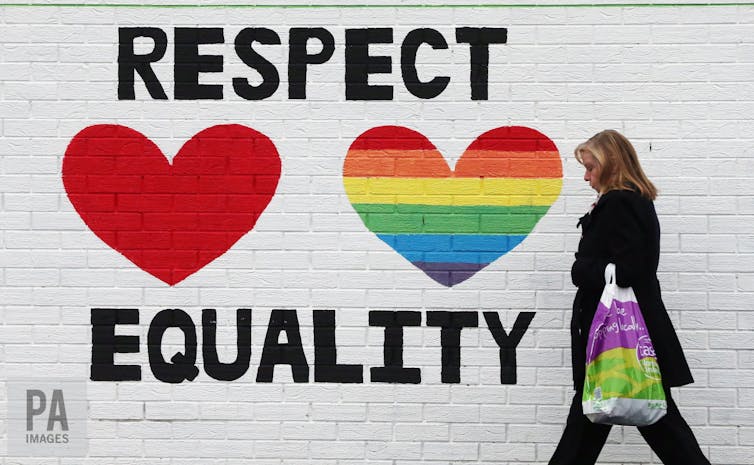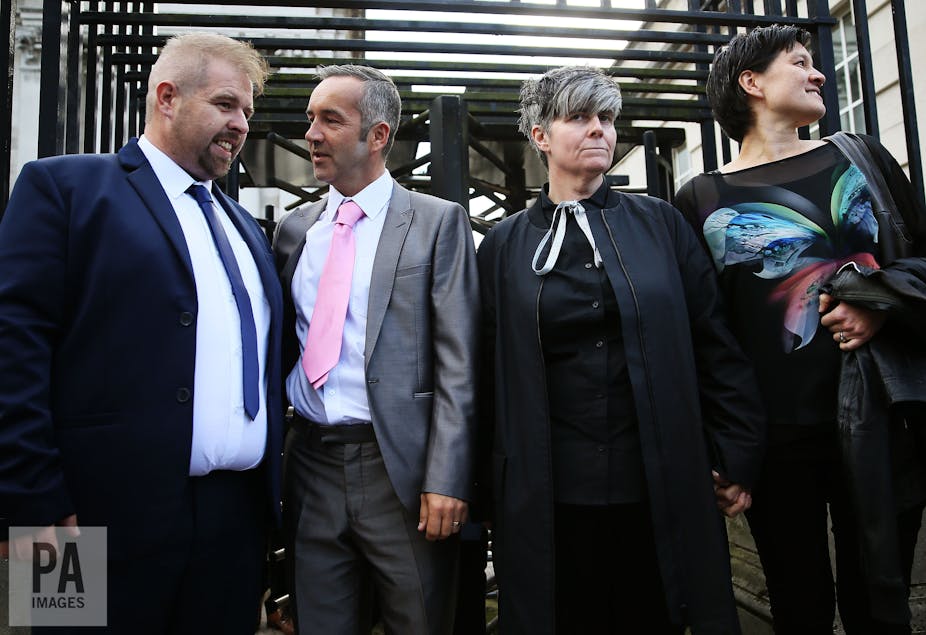In another setback for marriage equality in Northern Ireland, two challenges to the country’s ban on same-sex marriage were dismissed by the High Court in Belfast on August 17. The ruling involved two separate cases brought by couples who argued that their human rights were being breached because there is no law allowing for same-sex marriage, or the recognition of same-sex marriages in Northern Ireland. It is the only jurisdiction in the UK which does not allow same-sex marriage.
The first case involved two men who were married in London in 2014 and who had moved to Northern Ireland and were attempting to have their marriage legally recognised there. Under the current law, their marriage is treated as a civil partnership. The second case involved the two couples in civil partnerships – the first two couples to enter into civil partnerships when Northern Ireland became the first UK jurisdiction to introduce these in 2005 – who argued that the marriage ban breaches their right to private and family life.
In his judgment, Justice O’Hara dismissed the applicants’ legal challenges concluding that international human rights law had not been violated and that the laws on marriage are a matter of social policy and therefore the responsibility of the executive and legislature. He stated:
It is not at all difficult to understand how gay men and lesbians who have suffered discrimination, rejection and exclusion feel so strongly about the maintenance in Northern Ireland of the barrier to same-sex marriage. However, the judgment which I have to reach is not based on social policy but on the law.
How social policy can currently be implemented in Northern Ireland, however, is a moot question.
Stalemate in power-sharing
Since the collapse of the power-sharing assembly in January 2017 following a financial scandal, there has not been a functioning executive or legislature for eight months. Power-sharing between nationalist and unionist parties, including a joint office of first minister and deputy first minister, are a requirement of the institutional arrangements established following the Northern Ireland peace process. However, the largest unionist party, the Democratic Unionist Party (DUP), and the largest nationalist party, Sinn Féin, remain at loggerheads. The issue of marriage equality remains one of the key points of contention.
Sinn Féin has argued that progress on equal marriage is one of its key prerequisites for entering back into government, while the DUP has a long history of opposing any such move. A previous attempt to legislate for same-sex marriage in 2015 won the backing of the majority of members of the Northern Ireland Assembly in Stormont, but was blocked by the DUP who used a mechanism known as a “petition of concern”.
The triggering of a petition of concern – which requires the signature of 30 members of the assembly – means that any proposed legislation will only pass if supported by a majority of both unionists and nationalists. This mechanism was originally intended as a protective measure to stop any one community overriding the views of another on the basis of a straightforward parliamentary majority. There has been criticism of the use of petitions of concern by both unionists and nationalists to veto legislation on the basis of party political interests such as same-sex marriage and welfare reform.

Public wants equality
The legislature is out of touch with public opinion on this issue. Recent survey data that I and colleagues have analysed shows that almost 60% of 1,210 respondents support the legal validation of same-sex marriage in Northern Ireland. LGBT equality remains a touchstone issue in Northern Ireland and has gained increased political attention across the UK in light of the confidence and supply political arrangement between the DUP and the Conservative Party following the June 2017 general election.
Many commentators, including Ruth Davidson, the leader of the Scottish Conservative Party, have been critical of the DUP position and have advocated for the extension of marriage equality legislation to Northern Ireland.
The clock is ticking for the re-establishment of the Northern Ireland Assembly, a situation that must be resolved by the end of the summer. Failure to establish a government may lead to a return to direct rule by the UK government. This would mean the return of functions and powers of the Stormont assembly to Westminster, a move which would be highly controversial. Either way, pending the outcome of the political resolution, it is clear that the issue of marriage equality will have to be decided in either Stormont – or Westminster.
Either way, pending the outcome of the political resolution, it is clear that the issue of marriage equality will have to be decided in either Stormont or Westminster. While resolution of marriage equality under direct rule may be unlikely, it remains a possibility.

